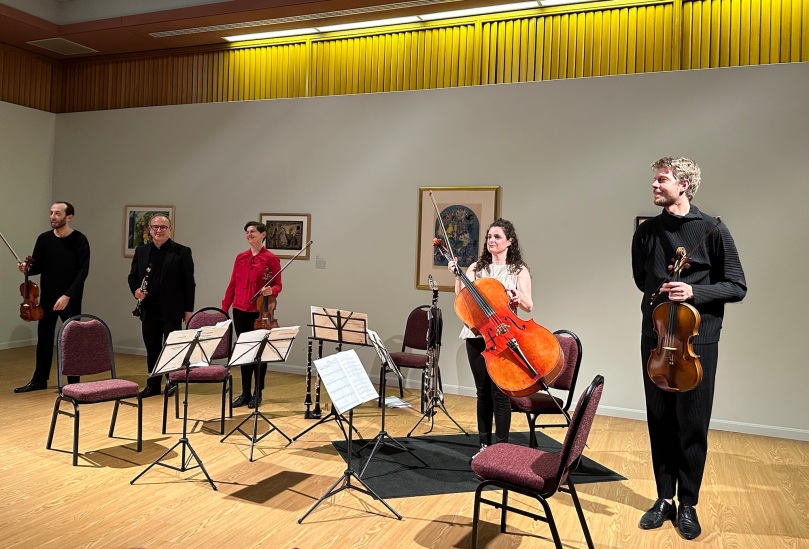
Maybe you’ve seen brief mentions of the Jewish Music Festival, with musical performances, lectures and sometimes art exhibitions taking place throughout the area. The festival is brand new, and organized by Aik Khai Pung, associate professor at CCM, where he is music director of the CCM Concert Orchestra. I noticed in an online listing that the Ariel String Quartet was playing last night at Hebrew Union College, and by luck, I was able to go.
The concert, which was co-presented by concert:nova and the Cincinnati Cultural Exchange, was held in Mayerson Auditorium in the Skirball Museum on the HUC campus. Curator Abby Schwartz provided commentary about the art by Jewish artists that surrounded us, and the paintings’ relationships to the music.
The musical artists for this program were sensational. The Ariel Quartet, quartet-in-residence at CCM, opened with Lera Auerbach’s “Frozen Dreams” and “Cetera Desunt” for string quartet. Both works were a revelation. “Frozen Dreams” was haunting and deeply personal. Auerbach’s music is simply astonishing; it is both searing and lyrical. In “Cetera Desunt” Auerbach took her cue from Shostakovich, and the listener could detect the repeating motive signifying Shostakovich’s signature. The superb performers — violinists Alexandra Kazovsky and Gershon Gerchikov, Jan Grüning, viola, and Amit-Even-Tov, cello — soared through this treacherous score with exciting precision and passion. In the frenzied passages, they dug into their strings with bows flying. I plan to try to hear more of Auerbach’s music.

They joined with clarinetist Pavel Vinnitsky for Osvaldo Golijov’s “The Dreams and Prayers of Isaac the Blind.” It is named for a blind, mystical rabbi who lived centuries ago, but is also a tribute to Golijov’s great-grandfather. This piece blends liturgical prayers in its outer movements with raucous Klezmer music. There could not have been a better champion for both styles than Vinnitsky, who wailed and almost danced in his seat as he performed Golijov’s riveting music, using three different clarinets.
Read the program notes for this program here.
Vinnitsky joined CCM’s clarinet faculty about two years ago. He and the Ariel Quartet will perform the Brahms Clarinet Quintet on March 26 at CCM, 7:30 p.m. in Werner Recital Hall. It’s not-to-be missed!
The Jewish Foundation is sponsor of the inaugural festival, a total of nine concerts and events. Other participants have included the Cincinnati Chamber Orchestra, composer Anna Vinnitsky, saxophonist Rick VanMatre and others.
Several more events are coming up:
March 14 — Yiddish Music by NKU performers, 7:30 p.m. at Plum Street Temple
March 17 — A concert this Sunday at 3 p.m. at the Mayerson JCC to hail the 120th anniversary of Israeli composer Marc Lavry, featuring the Seven Hills Symphony with William Herzog, violinist, in Bloch’s Baal Shem (Three Pictures of Chassidic Life)
March 19 — A piano and violin recital in HUC’s Scheuer Chapel, to include music by Aaron Copland and Paul Schoenfield
March 21 — Jewish choral music, including Bernstein’s “Chichester Psalms,” performed in Xavier University’s Bellarmine Chapel led by directors Matthew Swanson (newly appointed May Festival director of choruses) and Matthew Moquin-Lee with the Xavier Choir, soloists and instrumentalists
March 26 — Jews on Broadway Cabaret, 7 p.m. and 9 p.m. in Memorial Hall. The program by CCM musical theater stars of the future is curated by Rabbi Kenneth A. Kanter.
Tickets and information: cincinnatiartsandculturalexchange.org/concerts/jewish-music-festival
During a quick intermission I spoke to Pung, who also leads the Seven Hills Symphony, about his vision for this series.
It started with William Herzog, a violin professor at Northern Kentucky University, who wanted to perform with Pung’s Seven Hills Symphony, and proposed Bloch’s Baal Shem. “So I had that in mind, that we were going to do this Jewish composer, why not make it two orchestral concerts with Jewish composers?” Pung said. When he looked into it, he was told, you can’t just have orchestral music, you need to have voice, Yiddish music, choral music… so he began reaching out to his colleagues in Cincinnati about potentially putting a festival together.
“Graciously, everyone said yes!” he said.
It was a first, and things like marketing and ticketing could have been better, he admits. But he considers it a learning process. Some of the concerts have been free, and the halls are full. “I think audiences are still looking for something to do without paying too much,” he said.
Next year, Pung is already thinking of a Latin-themed festival. He’s also on the CSO board, where everyone is talking about how to bring the audience back. Right now, he’s producing a performance of Carmina Burana, that popular cantata by Carl Orff, April 6 in Music Hall. Four orchestras and nine choirs will be participating, along with three soloists, and Pung conducting.
“It’s a way to bring people together,” he says.
Admission is $15. Information: cincinnatiarts.org/events.
